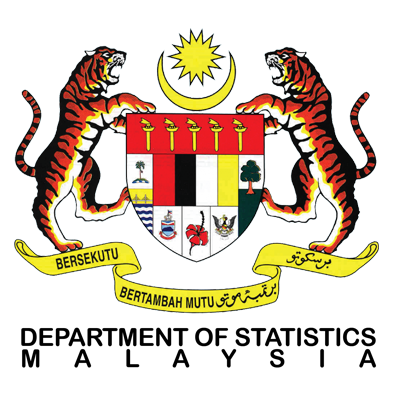Malaysia External Trade Statistics
- Home
- Statistics
- Economy
- External Sector
- Malaysia External Trade Statistics
Malaysia External Trade Statistics February 2019
Malaysia External Trade Statistics January 2019 30 January 2019
Malaysia External Trade Statistics December 2018 4 January 2019
Malaysia External Trade Statistics November 2018 5 December 2018
Malaysia External Trade Statistics October 2018 5 November 2018
Malaysia External Trade Statistics September 2018 5 October 2018
Malaysia External Trade Statistics August 2018 Show all release archives
Overview

KEY FACTS
- Malaysia’s exports in February 2019 recorded a decrease of 5.3% year-on-year (y-o-y) to RM66.6 billion, the lowest value since August 2016. Re-exports was valued at RM10.5 billion, decreased 28.1% and accounted for 15.7% of total exports. Domestic exports increased RM342.5 million or 0.6% to RM56.2 billion.
- Imports declined 9.4% y-o-y to RM55.5 billion, marking the lowest value since May 2016.
- On a month-on-month (m-o-m) basis, exports decreased RM18.8 billion (-22.0%) from RM85.4 billion. In seasonally adjusted terms, exports registered a decrease of 15.3%.
- On a m-o-m basis, imports posted a decrease of RM18.3 billion (-24.8%) from RM73.9 billion. In seasonally adjusted terms, imports fell 14.4%.
- On a y-o-y basis, the decrease in exports was attributed to lower exports to Hong Kong (-RM636.6 million), Indonesia (-RM632.9 million), the United States (-RM616.0 million) and Viet Nam (-RM532.8 million).
- On a y-o-y basis, lower imports were mainly from China (-RM3.4 billion), Singapore (-RM1.2 billion) and European Union (-RM1.1 billion).
TRADE
Total trade in February 2019 declined 7.2% to RM122.1 billion from February 2018. It also declined 23.3% or RM37.1 billion as compared to the previous month. The trade surplus was RM11.1 billion, surged 22.7% or RM2.0 billion when compared to the previous year. However, it decreased RM452.5 million (-3.9%) as compared to the previous month.
EXPORTS
On a y-o-y basis, exports decreased 5.3% to RM66.6 billion. The main products which attributed to the decrease were:
- Refined petroleum products, which contributed 5.4% to total exports, declined RM1.6 billion or 30.9% to RM3.6 billion.
- Palm oil and palm oil-based products (7.1% of total exports), shrank RM730.1 million (-13.4%) to RM4.7 billion. Exports of palm oil, the major commodity in this group of products also decreased RM346.0 million or 11.4% due to the decrease in average unit value (-13.6%) as export volume increased 2.5%;
- Crude petroleum, which accounted for 2.9% of total exports decreased RM530.2 million or 21.8% to RM1.9 billion due to the decrease in both export volume (-16.8%) and average unit value (-6.0%);
- Natural rubber (0.3% of total exports) dropped RM69.9 million or 23.1% to RM233.1 million due to the decline in both export volume (-17.2%) and average unit value (-7.1%); and
- Timber and timber-based products, which accounted for 2.1% of total exports, declined RM23.6 million or 1.7% to RM1.4 billion.
However, the following products recorded increases:
- Electrical and electronic (E&E) products (38.8% of total exports), increased RM1.2 billion or 4.9% to RM25.8 billion; and
- Liquefied natural gas (LNG), which contributed 4.7% of total exports grew RM247.7 million or 8.6% to RM3.1 billion due to the increase in average unit value (+18.9%) as export volume fell 8.7%.
On a m-o-m basis, exports decreased 22.0% or RM18.8 billion from RM85.4 billion. The main products which attributed to the decrease were:
- E&E products was lower by RM8.5 billion or 24.7% from RM34.3 billion;
- LNG, was down RM2.0 billion (-39.1%) from RM5.2 billion due to the lower export volume (-40.4%) as average unit value increased 2.2%;
- Palm oil and palm oil-based products decreased RM709.5 million or 13.1% from RM5.4 billion. Exports of palm oil decreased RM581.2 million or 17.8% due to the decrease in export volume (-21.6%) as average unit value increased 4.9%;
- Timber and timber-based products decreased RM702.8 million or 33.8% from RM2.1 billion;
- Crude petroleum declined RM558.3 million or 22.7% from RM2.5 billion due to the decrease in both export volume (-22.5%) and average unit value (-0.2%);
- Refined petroleum products, dropped RM59.9 million or 1.6% from RM3.7 billion due to the decrease in average unit value (-2.3%) as export volume increased 0.6%; and
- Natural rubber decreased RM42.0 million or 15.3% from RM275.1 million due to the lower export volume (-17.5%) as average unit value increased 2.7%.
Exports to Country of Destination
The two major destinations for Malaysia's exports in February 2019 were Singapore and China. Exports to Singapore amounted to RM9.1 billion decreased RM267.7 million (-2.9%) as compared to the previous year.
The main products which attributed to the decrease were:
- Refined petroleum products, which contributed 11.4% to total exports, declined RM355.8 million or 25.5% to RM1.0 billion; and
- Palm oil and palm oil-based products (1.6% of total exports), shrank by RM55.3 million (-27.9%) to RM143.0 million.
However, E&E products (49.5% of total exports), increased RM256.3 million or 6.0% to RM4.5 billion;
- Exports to China which were valued at RM8.5 billion also decreased RM138.5 million (-1.6%). The main products which attributed to the decrease were:
- Residual petroleum products and related materials which contributed 2.8% of total exports fell RM480.7 million or 66.6% to RM240.9 million;
- Measuring, checking, analysing and controlling instruments and apparatus which contributed 1.6% of total exports fell RM362.7 million or 72.6% to RM137.1 million; and
- Iron ore and concentrates which contributed 0.7% of total exports fell RM191.0 million or 75.5% to RM62.1 million.
However, these main products which contributed to the increase were:
- E&E products which contributed 40.4% of total exports rose RM406.5 million or 13.4% to RM3.4 billion;
- LNG which contributed 5.2% of total exports rose RM228.5 million or 107.1% to RM441.9 million; and
- Refined petroleum products which contributed 4.5% of total exports rose RM148.1 million or 62.3% to RM386.1 million.
Seasonally Adjusted Figure
On a m-o-m basis seasonally adjusted terms, exports declined RM13.4 billion (-15.3%) to RM73.8 billion.
Exports, 2015 - 2019

IMPORTS
On a y-o-y basis, imports fell 9.4% to RM55.5 billion. The decrease in imports was attributed to capital, intermediate and consumption goods.
- Capital Goods
Imports of capital goods, which contributed 11.9% to total imports, declined RM1.2 billion or 14.9% to RM6.6 billion due to the decrease in both transport equipment, industrial (-RM870.7 million, -51.5%) and capital good (except transport equipment) (-RM290.6 million, -4.8%).
- Intermediate Goods
These goods which constituted 57.4% of total imports decreased RM910.9 million (-2.8%) to RM31.9 billion. The decrease was mainly attributed to industrial supplies, processed (-RM956.0 million, -7.4%), fuel & lubricants processed, others (-RM729.6 million, -43.3%) and parts & accessories of capital goods (except transport equipment) (-RM595.1 million, -5.3%). On the other hand, fuel & lubricants, primary and food & beverages, primary, mainly for industries increased RM1.4 billion (+78.2%) and RM155.1 million (+34.3%) respectively.
- Consumption Goods
Imports of consumption goods which accounted for 8.2% of total imports recorded a decrease of RM595.7 million (-11.6%) to RM4.6 billion. The decrease was attributed to durables (-RM182.6 million, -26.8%), semi-durables (-RM176.1 million, -16.8%) and food & beverages, primary, mainly for household consumption (-RM131.7 million, -19.0%).
On a m-o-m basis, imports decreased RM18.3 billion or 24.8% from RM73.9 billion.
The decrease was attributed to intermediate, capital and consumption goods.
- Intermediate Goods
These goods fell RM5.6 billion (-14.9%) from RM37.5 billion. The main component attributing to the decrease was industrial supplies, processed (-RM5.3 billion, -30.8%).
- Capital Goods
Imports of capital goods shrank RM2.4 billion or 26.4% from RM9.0 billion due to the decrease in capital good (except transport equipment) (-RM2.7 billion, -32.0%). Meanwhile, transport equipment, industrial increased RM357.4 million or 77.5%.
- Consumption Goods
Imports of consumption goods decreased RM2.0 billion (-30.1%) from RM6.5 billion. The decrease was due to semi-durables (-RM452.1 million, -34.2%), food & beverages, primary, mainly for household consumption (-RM443.2 million, -44.1%), food & beverages, processed, mainly for household consumption (-RM362.2 million, -21.7%) and durables (-RM356.1 million, -41.7%)
Imports by Country of Origin
The two main sources of Malaysia’s import in February 2019 were China and Singapore. Imports from China amounted to RM9.2 billion decreased RM3.4 billion (-27.0%) as compared to the previous year.
The main products which attributed to the decrease were:
- E&E products, which contributed 36.5% of total imports fell RM781.8 million or 18.9% to RM3.3 billion;
- Refined petroleum products (2.5% of total imports), decreased RM 631.3 million or 73.4% to RM228.7 million; and
- Iron and steel bars, rods, angles, shapes and sections (including sheet piling), which accounted for 1.0% of total imports, fell RM194.7 million or 67.3% to RM94.6 million.
Imports from Singapore decreased RM1.2 billion (-17.2%) to record RM6.0 billion as compared to the previous year.
The main products which attributed to the decrease were:
- Refined petroleum products (26.7% of total imports), decreased RM864.4 million or 35.1% to RM1.6 billion; and
- Aluminium (including alloys), which contributed 0.1% of total imports, shrank RM236.2 million or 96.6% to RM8.3 million.
Seasonally Adjusted Figure
On a m-o-m basis seasonally adjusted terms, imports decreased RM10.5 billion (-14.4%) to RM62.7 billion.
Imports, 2015 - 2019

MARKET SHARE
The following charts show Malaysia's major trading partners for January - February 2019.
Total Trade by Major Countries, Jan - Feb 2019, percentage share

Exports and Imports by Major Countries, Jan - Feb 2019, percentage share

The following charts show Malaysia’s trade with ASEAN countries for January - February 2019.
Exports, Jan - Feb 2019, percentage share

Imports, Jan - Feb 2019, percentage share

#Notes:
1. The February 2019 data is provisional and subject to revision in later issues.
2. This report can be accessed through the web portal of the Department of Statistics, Malaysia (https://www.dosm.gov.my) under section: Latest Release.
Released By:
DATO' SRI DR. MOHD UZIR MAHIDIN
CHIEF STATISTICIAN MALAYSIA
DEPARTMENT OF STATISTICS, MALAYSIA
![]() DrUzir_Mahidin
DrUzir_Mahidin ![]()
![]() Dr_Uzir
Dr_Uzir
4 APRIL 2019
Contact person:
Ho Mei Kei
Public Relation Officer
Strategic Communication and International Division
Department of Statistics, Malaysia
Tel : +603-8885 7942
Fax : +603-8888 9248
Email : mkho[at]dosm.gov.my
Subscribe
Newsletter
Subscribe to our newsletter and stay updated
For interviews, press statement and clarification to the media, contact:
Baharudin Mohamad
Public Relation Officer
Email: baharudin[at]dosm.gov.my
Phone: 03 8090 4681
Not found what you looking for? Request data from us, through
Go to eStatistik
Email: data[at]dosm.gov.my
Phone: 03 8885 7128 (data request)










